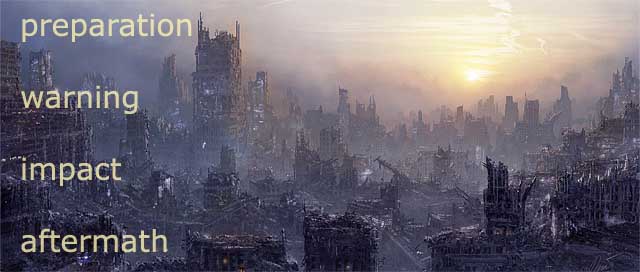4 Phases of Disaster
Preparedness for disaster. Consider breaking it down into 4 phases of disaster. That makes it easier to plan for. In my opinion, one way to think about it is as follows. Preparation (mitigation), Warning (awareness), Impact (cause and effect), and Aftermath (the results). Here’s what I mean…
PREPARATION
Preparedness begins with the acceptance that risk does exist. And enough such that it warrants action to prepare.
Risk Awareness motivates into action – depending on the given risk I suppose.
Being the first among 4 phases of disaster, determine and examine the current situation and state of readiness (or lack thereof). Then consider contingencies and mitigation for various scenarios which may come to be – due to the risk(s).
Preparations, Preparedness, Mitigation. It may vary widely in scope, resources, and acquired knowledge. And at a minimum from the point of view of survival, should focus on basics which include shelter, water, food, and security.
The preparation phase is (can be) a big one. It’s where most preppers remain in their thought process and actions. It may seem as though we’re never prepared enough… and thus we continue our efforts to ‘be ready’ for what may come.
There’s nothing wrong with this. It is logical.
But there’s more…
WARNING
Preparedness for disaster not only involves one’s preparations and mitigation actions, but recognizing the warning signs (of coming disaster) may provide a tremendous advantage. In other words, keep an eye out for signs that “it” (whatever it is) may be coming or about to happen.
If we’re all too busy ‘with our noses to the grind stone’ we might not have the situational awareness to recognize the clues that may be indicating impending disaster (or the increasing risk thereof).
Disaster may come on slowly, or it may ‘hit us over the head’ so to speak. Remember, it’s not the fall…it’s the sudden stop at the end.
Some natural-disasters are forewarned by technology (e.g. severe weather) and will enable time to take action for those who are aware (severe weather, tornadoes, hurricanes, wildfires, etc.). While other natural-disasters occur instantly with little or no warning (earthquakes, tsunamis, X-class solar-flare CME/EMP).
And then there are the warning signs of disaster from the standpoint of mankind. Things like economic/financial (collapse), politically motivated/induced chaos, wars.
Some warning signs are subtle. Building slowly. Others are ‘in your face’ although often unrecognized by the masses.
Another tip… Our modern world and ‘the system’ that we live in is designed to keep us distracted from the recognition of true reality. By merely ‘knowing’ that this is the case will help open your eyes to some of the warning signs around you…
UNDERSTANDING THE IMPACT
The shock and impact of disaster itself. The third of the 4 phases of disaster (at least from my own POV).
By attempting to understand (ahead of time) the many affects of disaster’s immediate impact, will help in your own preparedness for it.
If you’re camping or traveling and drink contaminated water, the impact of getting ‘Montezuma’s Revenge’ will be pretty debilitating. So perhaps a good idea would be to take along a drinking water filter.
The impact of an evacuation order will mean clogged main roads. So you might plan ahead alternative routes of back-roads to get out of Dodge… or get out before the masses.
The immediate impact when the sheeple realize that their grocery store shelves are thinning will rapidly lead towards panic buying and shortages. So having your own deep pantry (ahead of time) will avoid being caught short…
The impact phase of disaster may be frightful and shocking to the unprepared. This may result in their inability to take action, delayed reaction, and may lead to to poor decision making during the time of crisis. Many will do nothing while they wait for help.
Understanding the immediate impact of a hypothetical disaster scenario will help you better prepare for it. Understand and predict the immediate reactions of the unprepared.
AFTERMATH
After having considered the effects of the disaster’s impact itself, you then need to consider the aftermath.
It may be short, long, or in-between. Think about how the aftermath will affect and/or change your life, and that of others. And for how long. Prepare for it.
Think about what will you need to have done ahead of time to survive the aftermath. Think beyond just the supplies, the preps, the stuff… do you have the skills and ability to implement your survival?
For serious disaster, the unprepared will falter and fail during a long aftermath timeline. Without help they will be desperate and doomed. Will this affect you? The fact that others are unprepared around you? Yes, it certainly may (in more ways than one)! So analyze it, and do what you feel compelled to do about it.
It’s all just one man’s opinion, and food for thought…
[ Read: Shortwave Radios For Preppers ]

